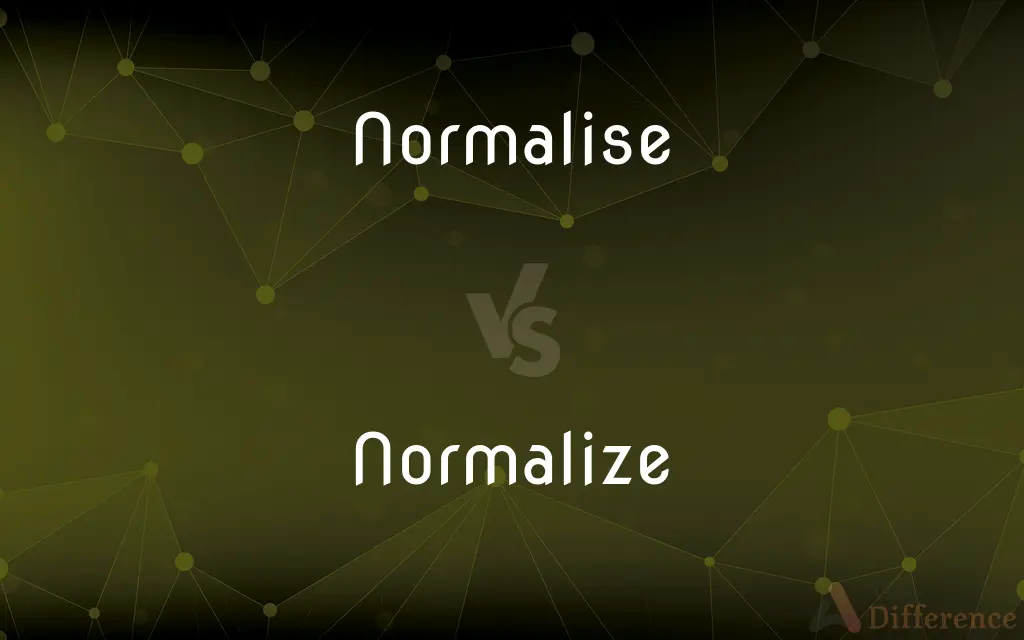Normalise vs. Normalize — What's the Difference?
Edited by Tayyaba Rehman — By Maham Liaqat — Updated on April 7, 2024
Normalize is the preferred spelling in American English for making or becoming normal, while normalise is favored in British English.

Difference Between Normalise and Normalize
Table of Contents
ADVERTISEMENT
Key Differences
Normalize is widely used in American English to describe the process of bringing or returning something to a standard or usual state or condition. Whereas, normalise, although conveying the same meaning, is more commonly used in British English, reflecting the regional spelling variation.
In the context of data processing and statistics, to normalize data means to adjust values measured on different scales to a common scale. On the other hand, normalise, following the British convention, refers to the same process of adjusting data, ensuring consistency across linguistic borders.
When discussing social behavior, normalize often refers to making certain practices or ideas acceptable within societal norms. In contrast, normalise is used similarly in British contexts, promoting the acceptance of new standards or behaviors as normal.
In scientific and technical fields, normalize is a term used to describe the process of making something conform to a standard. Conversely, normalise serves the same function in non-American English-speaking countries, ensuring that terminology reflects the diversity of English language usage globally.
Both spellings are understood internationally, normalize is typically seen in American publications and documents, emphasizing standardization in linguistic practices. Meanwhile, normalise is more likely to appear in texts originating from the UK, Australia, and other Commonwealth nations, illustrating the nuanced differences in English spelling conventions.
ADVERTISEMENT
Comparison Chart
Spelling
-ize ending
-ise ending
Usage Region
United States
United Kingdom, Australia, others
Context
Data processing, societal norms, scientific fields
Same as normalize, but in British English contexts
Publications
American journals, books, and guidelines
British, Australian, and other Commonwealth publications
Perception
Standard American English
Preferred in British English and by certain style guides outside the US
Compare with Definitions
Normalise
To bring or return to a normal condition or state.
The company took steps to normalize operations after the strike.
Normalize
To make certain behaviors or practices acceptable within society.
There's been a push to normalise flexible working hours.
Normalise
To make acceptable or normal in social context.
Efforts to normalize diplomatic relations.
Normalize
To make standard across different instances.
The new regulations will normalise safety procedures.
Normalise
In database design, to organize data to reduce redundancy.
Normalizing the database improved performance.
Normalize
In database design, to organize data to reduce redundancy and dependency.
Normalising the database can prevent data anomalies.
Normalise
To make standard.
Software to normalize audio levels.
Normalize
To adjust disparate measures to a common scale.
The study normalised the scores for comparison.
Normalise
To adjust measures to a common scale.
The tests were normalized for age and gender.
Normalize
To bring or return something to a normal condition or state.
The government's intervention aimed to normalise economic growth.
Normalise
Standard spelling of normalize
Normalize
To make normal, especially to cause to conform to a standard or norm
Normalize a patient's temperature.
Normalizing relations with a former enemy nation.
Normalise
Become normal or return to its normal state;
Let us hope that relations with this country will normalize soon
Normalize
To cause (something previously regarded as anomalous) to be accepted as normal, thereby altering the accepted norm
“The increased visibility of Iraq War amputees has helped normalize the use of prostheses” (Bruce Barcott).
Normalise
Make normal or cause to conform to a norm or standard;
Normalize relations with China
Normalize the temperature
Normalize the spelling
Normalize
To make (a text or language) regular and consistent, especially with respect to spelling or style.
Normalize
To remove strains and reduce coarse crystalline structures in (metal), especially by heating and cooling.
Normalize
To become or return to normal
Waiting for diplomatic relations to normalize.
Normalize
(transitive) To make normal, to make standard.
There is little hope that the two countries will normalize relations; their governments seem to hate each other and would just as soon stay on bad terms.
Normalize
(transitive) To format in a standardized manner, to make consistent.
We'll need to normalize these statements before we can compare them.
Normalize
To reduce the variations by excluding irrelevant aspects.
After we properly normalize the measurements with respect to age, gender, geography and economic considerations, there remains little evidence of a difference between the two groups.
Normalize
To return a set of points (switches) to the normal position.
Normalize
To return to the normal position from the reverse position.
Normalize
To subject to normalization; to eliminate redundancy in (a model for storing data).
Normalize
To anneal (steel) for the purpose of decreasing brittleness and increasing ductility.
Normalize
To divide a vector by its magnitude to produce a unit vector.
Normalize
To make normal; as, to normalize relations with China.
Normalize
To make standard; determine the value by comparison to an item of known standard value; as, The test results were normalized for changes in the number of questions before comparison with the previous year's values.
Normalize
To convert to a standard form or measure; adjust the value or values so as to conform to a standard measure or pattern; as, The probabilities were normalized to add up to 1.00.
Normalize
Become normal or return to its normal state;
Let us hope that relations with this country will normalize soon
Normalize
Make normal or cause to conform to a norm or standard;
Normalize relations with China
Normalize the temperature
Normalize the spelling
Normalize
Toughen (steel or glass) by a process of gradually heating and cooling;
Temper glass
Common Curiosities
Can both spellings be used in scientific writing?
Yes, both can be used, but consistency with the chosen English variant is recommended.
Are normalize and normalise interchangeable?
Yes, they are interchangeable, with the choice of spelling depending on the regional version of English being used.
Is it necessary to normalize test scores?
Normalizing test scores can be necessary for fair comparison across different populations or conditions.
Does normalizing data mean the same in both American and British English?
Yes, it refers to the same process of adjusting data to a common scale.
Can normalizing social behaviors impact societal norms?
Yes, it can contribute to changing societal norms by making certain behaviors more accepted.
Are there contexts where one spelling is preferred over the other?
In general, the preference is regional rather than contextual.
How do style guides recommend using these terms?
Style guides recommend choosing the spelling consistent with the version of English you are using (American vs. British).
Are there tools to help normalize or normalise data?
Yes, there are various software tools and statistical techniques for data normalization.
Is one spelling more correct than the other?
No, correctness is determined by regional usage standards.
Do both terms apply in social contexts as well as technical ones?
Yes, they can be used in both contexts with the same meanings.
Can the spelling affect the perception of the text's professionalism?
Yes, using the appropriate regional spelling can influence the perceived professionalism and target audience of a text.
How does normalizing a database affect its performance?
It can improve performance by reducing redundancy and ensuring data integrity.
How do educators approach normalizing in academic settings?
They might normalize grades to adjust for differences in test difficulty or class performance.
Is the choice between normalize and normalise significant in international communication?
In most cases, the meaning is clear regardless of spelling, though using the variant familiar to the audience can aid in clarity.
Is there a difference in the process of normalizing in different fields?
While the concept is broadly similar, the specifics can vary significantly between fields such as statistics, database management, and audio engineering.
Share Your Discovery

Previous Comparison
Paparazzo vs. Paparazzi
Next Comparison
Demonise vs. DemonizeAuthor Spotlight
Written by
Maham LiaqatEdited by
Tayyaba RehmanTayyaba Rehman is a distinguished writer, currently serving as a primary contributor to askdifference.com. As a researcher in semantics and etymology, Tayyaba's passion for the complexity of languages and their distinctions has found a perfect home on the platform. Tayyaba delves into the intricacies of language, distinguishing between commonly confused words and phrases, thereby providing clarity for readers worldwide.














































